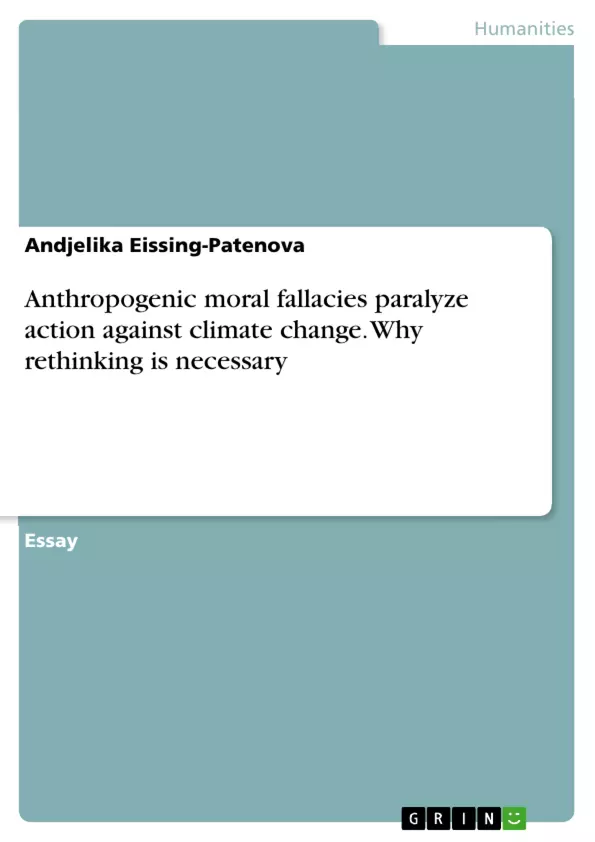Inaction against the climate change problem can (inter alia) be traced to moral fallacies, for they distract us from realizing our moral duties and responsibilities and so hinder us to take action. It is not sufficient to ask for the obviously apparent reasons for natural catastrophes and all the other negative effects climate change entails, i.e. greenhouse gas emissions. Instead, we have to think a step further and ask for the causes of our pollutive behavior, which are, as claimed in the paper, for instance based on false assumptions about intergenerational justice and the value of progress in our modern consumer society. Thus, becoming able to act requires a rethinking of our morality. To overcome the here discussed two moral fallacies, i.e. the non-identity problem and the overestimation of progress, would mean a large step towards saving the planet and providing our successors with living conditions that are at least of the same quality as ours.
Inhaltsverzeichnis (Table of Contents)
- Content
- INTRODUCTION
- KEY ARGUMENT
- ESSAY OUTLINES
- NOTIONS AND GENERAL REMARKS
- ANTHROPOGENIC MORAL FALLACIES AS AN OBSTACLE TO TAKING ACTION AGAINST CLIMATE CHANGE
- (P1) FALLACIES ABOUT THE NON-IDENTITY PROBLEM
- (P2) OVERESTIMATION OF PROGRESS AND THE MODERN CONSUMER SOCIETY
Zielsetzung und Themenschwerpunkte (Objectives and Key Themes)
This paper examines the anthropogenic moral fallacies that hinder action against climate change. It argues that these fallacies distract us from assuming moral duties and responsibilities, preventing us from taking the necessary steps to address this urgent issue. The paper explores the underlying causes of our pollutive behavior, highlighting the importance of re-evaluating our assumptions about the future of humanity and the value of progress in developed societies.
- Anthropogenic moral fallacies as obstacles to taking action against climate change
- The non-identity problem as a moral fallacy
- The overestimation of progress and the modern consumer society as a moral fallacy
- Rethinking our moral assumptions about the future of humanity
- The importance of assuming responsibility for climate change
Zusammenfassung der Kapitel (Chapter Summaries)
- Introduction: This chapter introduces the main argument of the paper, which claims that inaction against climate change stems from anthropogenic moral fallacies. It outlines the two key fallacies discussed in the paper: the non-identity problem and the overestimation of progress. The chapter also provides a brief overview of the essay's structure and the key issues addressed.
- Anthropogenic Moral Fallacies as an Obstacle to Taking Action Against Climate Change: This chapter introduces the concept of anthropogenic moral fallacies and explains how they hinder our ability to take action against climate change. It argues that these fallacies distract us from assuming moral duties and responsibilities, leaving us paralyzed in our efforts to protect the planet and future generations.
- (P1) Fallacies About the Non-Identity Problem: This chapter delves into the first moral fallacy: the non-identity problem. It explores the argument that future generations will not be harmed by our current actions because they will not be the same individuals if climate change occurs. The chapter critiques this argument, demonstrating how it is based on flawed assumptions and does not justify inaction.
- (P2) Overestimation of Progress and the Modern Consumer Society: This chapter examines the second moral fallacy: the overestimation of progress. It argues that our modern consumer society promotes an unsustainable and self-serving perspective on progress, neglecting the long-term consequences of our actions for the environment and future generations. The chapter challenges this perspective, urging a shift in our values and priorities to prioritize sustainability and environmental responsibility.
Schlüsselwörter (Keywords)
This paper focuses on the following key concepts: anthropogenic moral fallacies, non-identity problem, overestimation of progress, climate change, environmental responsibility, future generations, moral duties, and inaction. It analyzes how these concepts intertwine to influence our understanding of climate change and our ability to take action against it.
- Quote paper
- Andjelika Eissing-Patenova (Author), 2018, Anthropogenic moral fallacies paralyze action against climate change. Why rethinking is necessary, Munich, GRIN Verlag, https://www.grin.com/document/421196



